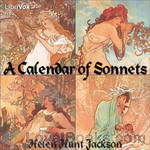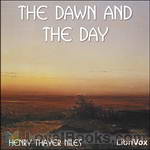|
Books Should Be Free Loyal Books Free Public Domain Audiobooks & eBook Downloads |
|
|
Books Should Be Free Loyal Books Free Public Domain Audiobooks & eBook Downloads |
|
Poetry |
|---|
|
Book type:
Sort by:
View by:
|
By: Helen Hunt Jackson (1830-1885) | |
|---|---|
 A Calendar of Sonnets
A Calendar of Sonnets
Helen Hunt Jackson is probably most famous for her work on behalf of Native Americans’ rights. However, this short volume presents a sonnet for each month of the year, devoted simply and beautifully to the shifting wonder of nature through the seasons. | |
 Calendar of Sonnets (Version 3)
Calendar of Sonnets (Version 3)
Helen Hunt Jackson wrote poetry, nonfiction and fiction and was a popular author in her own time. This sonnet sequence reviews the months of the year and demonstrates her poetic talent. - Summary by Newgatenovelist | |
 Morn
Morn
volunteers bring you 13 recordings of Morn by Helen Hunt Jackson. This was the Weekly Poetry project for March 8, 2020. ------ Helen Hunt Jackson was an American poet and writer who became an activist on behalf of improved treatment of Native Americans by the United States government. This poem about waking up in the morning is from the collection Sonnets and Lyrics . | |
 November
November
Helen Maria Hunt Jackson, born Helen Fiske was an American poet and writer who became an activist on behalf of improved treatment of Native Americans by the U.S. government. She described the adverse effects of government actions in her history A Century of Dishonor (1881). Her novel Ramona* (1884) dramatized the federal government's mistreatment of Native Americans in Southern California after the Mexican–American War and attracted considerable attention to her cause. Commercially popular, it was estimated to have been reprinted 300 times and most readers liked its romantic and picturesque qualities rather than its political content... | |
By: Helen Leah Reed (1860-1926) | |
|---|---|
 Weed or Flower
Weed or Flower
volunteers bring you 12 recordings of Weed or Flower by Helen Leah Reed. This was the Weekly Poetry project for September 22, 2019. ------ American teacher and author; known for her children's books, which were entertaining as well as educative, the best remembered being her Brenda series of novels. - Summary by Wikisource | |
By: Hélène A. Guerber (1859-1929) | |
|---|---|
 The Book of the Epic
The Book of the Epic
| |
By: Henrik Ibsen (1828-1906) | |
|---|---|
 Peer Gynt
Peer Gynt
Peer is a dreamer, liar, excellent storyteller and an irresponsible person who avoids all problems. He uses and discards women and looks towards the grandiose, the unattainable. Despite of this, one can't help but like and feel sorry for Peer, as it is easy to recognize something of yourself in him. Peer Gynt is the most well known Norwegian play throughout history and is based loosely on the folklore about Per Gynt. It is a dramatic poem in five acts, and has been aptly described as the story of a life based on procrastination and avoidance. The play is said to be a confrontation with the flock mentality Ibsen meant to recognize the typical Norwegian. | |
By: Henry Abbey (1842-1911) | |
|---|---|
 Stories in Verse
Stories in Verse
| |
By: Henry Austin Dobson (1840-1921) | |
|---|---|
 "You Bid Me Try"
"You Bid Me Try"
Henry Austin Dobson, commonly Austin Dobson, was an English poet and essayist. His official career was uneventful, but as a poet and biographer he was distinguished. Those who study his work are struck by its maturity.It was about 1864 that he turned his attention to writing original prose and verse, and some of his earliest work was his best. It was not until 1868 that the appearance of St Paul’s, a magazine edited by Anthony Trollope, gave Harry Dobson an opportunity and an audience; and during the next six years he contributed some of his favourite poems, including “Tu Quoque,” “A Gentleman of the Old School,” “A Dialogue from Plato,” and “Une Marquise... | |
By: Henry Hart Milman (1791-1868) | |
|---|---|
 Nala and Damayanti and Other Poems
Nala and Damayanti and Other Poems
| |
By: Henry John Newbolt (1862-1938) | |
|---|---|
 Poems: New and Old
Poems: New and Old
| |
By: Henry Kendall (1839-1882) | |
|---|---|
 After Many Years
After Many Years
volunteers bring you 18 recordings of After Many Years by Henry Kendall. This was the Fortnightly Poetry project for April 19, 2020. ------ Henry Kendall was the first Australian poet to draw his inspiration from the life, scenery and traditions of the country., from the Biographical Note by Bertram Stevens | |
 God Help Our Men at Sea
God Help Our Men at Sea
Kendall was born in a settler's hut by Yackungarrah Creek near Ulladulla, New South Wales, Australia. He was registered as Thomas Henry Kendall, but never appears to have used his first name. His three volumes of verse were all published under the name of "Henry Kendall". ( Wikipedia ) | |
By: Henry Lawson (1867-1922) | |
|---|---|
 Shame of Going Back
Shame of Going Back
Henry Archibald Hertzberg Lawson was an Australian writer and poet. Along with his contemporary Banjo Paterson, Lawson is among the best-known Australian poets and fiction writers of the colonial period and is often called Australia's "greatest short story writer". | |
 When Your Pants Begin To Go
When Your Pants Begin To Go
Henry Archibald Hertzberg Lawson was an Australian writer and bush poet. Along with his contemporary Banjo Paterson, Lawson is among the best-known Australian poets and fiction writers of the colonial period and is often called Australia's "greatest short story writer". He was the son of the poet, publisher and feminist Louisa Lawson. - Summary by Wikipedia | |
 Verses Popular And Humorous (Version 2)
Verses Popular And Humorous (Version 2)
Verses, Popular and Humorous was the second collection of poems by Australian poet Henry Lawson. It features some of the poet's earlier major works, including "The Lights of Cobb and Co", "Saint Peter" and "The Grog-An'-Grumble-Steeplechase". Most of the poems in the volume had been written after the publication of In the Days When the World was Wide and Other Verses in 1896. The original collection includes 66 poems by the author that are reprinted from various sources. Later publications split the collection into two separate volumes: Popular Verses and Humorous Verses, though the contents differed from the original list... | |
 Men Who Live It Down
Men Who Live It Down
MANY of the verses in this volume ) appeared originally in the SYDNEY Bulletin, others in the Daily Telegraph, Town and Country Journal, Evening News, World's News, Australian Star, Amateur Gardener, and KALGOORLIE Sun, while eleven are reprinted from The Children of the Bush, published by Messrs. Methuen and Co., London. | |
 Reedy River
Reedy River
volunteers bring you 12 recordings of Reedy River by Henry Lawson.. This was the Fortnightly Poetry project for August 22, 2021. ------ This Fortnightly Poem is taken from Verses Popular and Humorous . This was the second collection of poems by Australian poet Henry Lawson. - Summary by David Lawrence | |
 Ship
Ship
volunteers bring you 11 recordings of The Ship by Henry Lawson. This was the Fortnightly Poetry project for November 1, 2020. ------ Remembrance Day 2020; An excerpt from A Fantasy of War in the book My Army, O, My Army! and other songs by Henry Lawson - Summary by David Lawrence | |
 Shakedown on the Floor
Shakedown on the Floor
Despite the bittersweet outcome of the romance in this work, the poem still manages to conclude in an uplifting fashion. - Summary by SonOfTheExiles | |
 Above Lavender Bay
Above Lavender Bay
volunteers bring you 14 recordings of Above Lavender Bay by Henry Lawson. This was the Fortnightly Poetry project for January 10, 2021. ------ Henry Archibald Hertzberg Lawson was an Australian writer and bush poet. Along with his contemporary Banjo Paterson, Lawson is among the best-known Australian poets and fiction writers of the colonial period and is often called Australia's "greatest short story writer". This poem is taken from The Skyline Riders and Other Verses By Henry Lawson - Summary by Wikipedia | |
 Route March
Route March
volunteers bring you 16 recordings of The Route March by Henry Lawson. This was the Weekly Poetry project for November 8, Remembrance Day 2020. | |
 Scots Of The Riverina
Scots Of The Riverina
This poem tells the story of a boy in Australia who leaves the farm at harvest time. "and to run from home was a crime." The story is set in the Riverina, New South Wales in the town of Gundagai. | |
 Ships that Won't Go Down
Ships that Won't Go Down
Henry Lawson was an Australian writer and poet. Along with his contemporary Banjo Paterson, Lawson is among the best-known Australian poets and fiction writers of the colonial period and is often called Australia's "greatest short story writer". | |
By: Henry More (1614-1687) | |
|---|---|
 Democritus Platonissans
Democritus Platonissans
| |
By: Henry Thayer Niles (1825-1901) | |
|---|---|
 The Dawn and the Day
The Dawn and the Day
The Dawn and the Day, or, The Buddha and the Christ, Part 1 is a text similar to the epic poetry of Homer or, more accurately, classic Hindu texts, such as the Baghavad-Gita. | |
By: Henry Timrod (1828-1867) | |
|---|---|
 The Poems of Henry Timrod
The Poems of Henry Timrod
| |
By: Henry Van Dyke (1852-1933) | |
|---|---|
 Golden Stars And Other Verses Following "The Red Flower"
Golden Stars And Other Verses Following "The Red Flower"
| |
 Music and Other Poems
Music and Other Poems
| |
 Songs out of Doors
Songs out of Doors
| |
 The White Bees
The White Bees
| |
By: Henry Vaughan (1621-1695) | |
|---|---|
 Poems of Henry Vaughan, Silurist, Volume II
Poems of Henry Vaughan, Silurist, Volume II
MANUAL OF SURGERY, OXFORD MEDICAL PUBLICATIONSBY ALEXIS THOMSON, F.R.C.S.Ed.PREFACE TO SIXTH EDITION Much has happened since this Manual was last revised, and many surgical lessons have been learned in the hard school of war. Some may yet have to be unlearned, and others have but little bearing on the problems presented to the civilian surgeon. Save in its broadest principles, the surgery of warfare is a thing apart from the general surgery of civil life, and the exhaustive literature now available on every aspect of it makes it unnecessary that it should receive detailed consideration in a manual for students... | |